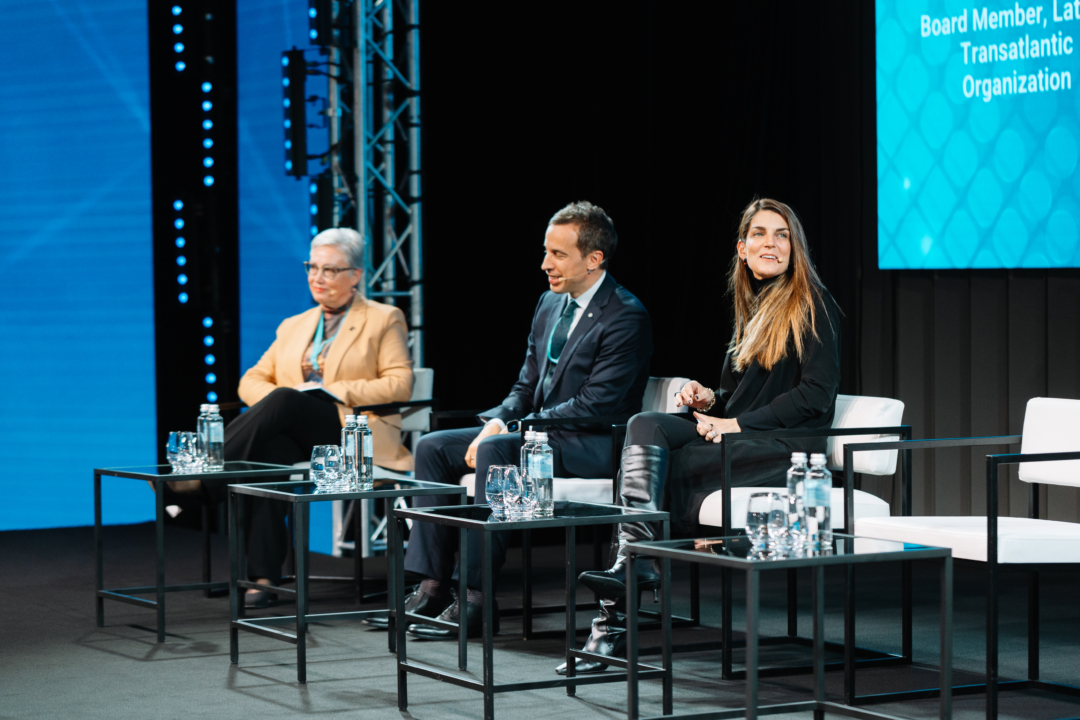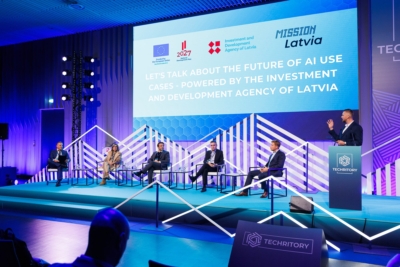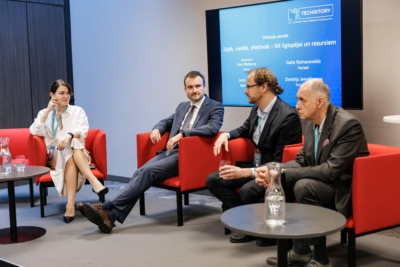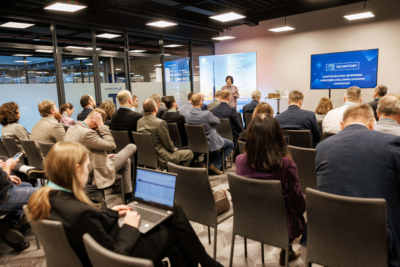Techritory 2025 is set to bring the global tech community together on October 22-23 in Riga, Latvia. The Techritory Forum is looking forward to gathering more than 800 innovators, policymakers, scientists, and thought leaders.
Under the theme “Connected Futures through Digital Paths,” the event will explore how cutting-edge technologies are shaping an increasingly connected world. On the stage, we will hear over 80 influential voices from the industry – here are the speakers not to miss.
Moreover, don’t forget to reserve your spot for this year’s event – register here.
Henna Virkkunen
Henna Virkkunen is the Executive Vice-President for Tech Sovereignty, Security, and Democracy at the European Commission (EC).
In this role, she tackles complex EU security threats while strengthening external borders and internal security, alongside her responsibility to ensure that our freedoms, justice, and democracy are strengthened. Additionally, Virkkunen oversees EC’s Digital and Frontier Technologies portfolio, leading Europe’s drive for a competitive, resilient, inclusive digital future and leadership in strategic technologies.
“[…] Europe stands at a very pivotal moment because we’re facing unprecedented geopolitical and geoeconomic competition. And nowhere is that more evident than in the field of technology. It is the engine of economic growth […], but also the engine of our security and global influence. And when we look at technologies and security and democracy, we can see that nowadays they are very much interlinked,” she noted at her keynote speech for EU Debates.
“Technology will define the future of Europe’s economy, […] our security, and global role. Our task is very clear here: to lead, not follow, in the next wave of innovation,” she concluded.
Jean Charles Ellermann-Kingombe
Jean Charles Ellermann-Kingombe is the Assistant Secretary General for Innovation, Hybrid, and Cyber at NATO.
He is the Secretary General’s primary advisor on maintaining NATO’s innovative edge, as well as on all issues related to technological challenges, cyber defence, and hybrid threats, including their far-reaching implications for Alliance security.
“We need more innovation. We must stay ahead of the threat. That means fostering agile, forward-looking approaches to threat detection, digital resilience, and incident response. We must embrace emerging technologies and support innovation, including through closer integration with industry and academia,” Ellermann-Kingombe stressed during his speech at the International Conference on Cyber Conflict, CyCon 2025.
“We must not only adopt new tools, we must shape them. We must be able to harness emerging technologies in a responsible way while ensuring that we are protected from their adversarial use and from adversaries targeting our own innovation streams.”
Mathias Cormann
Mathias Cormann is the 6th Secretary-General of the OECD.
“The OECD is a community of like-minded countries. We represent market-oriented democracies from around the world. We have 38 member countries […], and we are in the process of accession with a further eight countries. […] This shows a continued strong appetite for increased international cooperation on key economic, social, and environmental issues. Whether it is international tax reform, our shared interest in tackling climate change in a globally effective and equitable way, or ensuring that we have sensible policy and governance arrangements in place globally as we move forward with developments in artificial intelligence,” Cormann said.
Around the world, I still see a common interest in having a well-functioning global market and global trading system. Even in this challenging geopolitical context, I still see a strong appetite to find solutions to some of the common challenges of our time.
Before his appointment in 2021, he served as the Australian Minister for Finance, the Leader of the Government in the Australian Senate, and as Federal Senator representing the State of Western Australia. In these roles, he has been a strong advocate for the positive power of open markets, free trade, and the importance of a rules-based international trading system.
Evika Siliņa
Evika Siliņa is the Prime Minister of the Republic of Latvia. She took office in September 2023.
She has many years of experience in public administration and politics. In 2022, Siliņa was elected to the Latvian Parliament and was appointed to the office of the Minister for Welfare. She also held the position of Parliamentary Secretary to the Prime Minister from 2019 to 2022, and before that, from 2013 to 2019, she served as Parliamentary Secretary of the Ministry of the Interior.
“Latvia has been leading the development of 5G technologies since the very beginning. In response to increasing security challenges, Latvia has become a pioneer in researching, developing, and testing the use of 5G in defence,” Siliņa said in her opening speech at 5G Techritory 2024.
Cosmas Luckyson Zavazava
Since 1 January 2023, Cosmas Luckyson Zavazava has served as the Director of the Telecommunication Development Bureau (BDT) at the International Telecommunication Union (ITU).
With more than 30 years in telecommunications, including over 20 years in ITU’s Development Sector, Zavazava has promoted and implemented impactful information and communication technology projects around the world.
Prior to his election as BDT Director, he served as ITU’s Chief of Partnerships for Digital Development, overseeing development-related projects, strategic partnerships, and resource mobilization between 2019 and 2022. He also launched new initiatives that have boosted the engagement of industry, private-sector, and academia members in ITU’s work.
“We are in an era of collaborative regulation going beyond working in silos, where the digital regulators just discuss technology. Technology without impact on people is empty. So we want to make sure that regulators in the financial sector and many other sectors – education, health, etc. – they come to the table, and then we influence and support the ecosystem,” Zavazava said in an interview at the Global Symposium for Regulators.
Nina Hvid Enevoldsen
As of September 1, Nina Hvid Enevoldsen has stepped into her new role as Director of the Nordic Council of Ministers’ Office in Latvia. With her comes a strong diplomatic and business background – and an ambitious vision for how Nordic cooperation can strengthen democracy, resilience, and equality in the Baltic region and beyond.
Nina has joined the Nordic Council of Ministers’ Office in Latvia from the Danish Foreign Service, where she worked extensively with economic and trade policy at the Danish Embassy in Poland. Her career has also spanned business, Danish public institutions, and the EU Commission.
Upon being appointed to her new role, Hvid-Enevoldsen said: “Hand in hand with our Baltic partners, I want to leverage our partnerships and Nordic solidarity to help build up a robust European democracy based on Nordic values. One way of doing this will be to expand co-operation with other European countries.”
Colin Willcock
Colin Willcock is the chairman of the board of the 6G Smart Networks and Services Industry Association (6G-IA). He also serves as the vice-chairman of the board of the European Smart Networks and Services Joint Undertaking (SNS-JU) and vice-chairman of the European Telecommunications Standards Institute (ETSI) board.
He has detailed knowledge and experience of the telecommunications industry, having worked directly or indirectly with many of the major players for over 30 years. The roles have included software developer, technical consultant, technical marketing, standardization, and management.
In addition to line manager roles, he has participated extensively in standardization activities at ETSI, ITU-T, and 3GPP, including instrumental work in creating and developing the TTCN-3 testing language. Willcock has also been very active in the European research ecosystem, including leading a number of award-winning European projects such as TT-Medal, D-MINT, and SEMAFOUR. He is currently head of Research Alliances at Nokia.
Anne Stephan
Anne Stephan is a passionate technology leader with over 20 years of international experience in the telecommunications industry. She has held key leadership roles at Rohde & Schwarz, with a strong focus on wireless communications and critical infrastructure.
In 2021, she was appointed Vice President of Critical Infrastructure & Networks, where she continued to drive innovation and operational excellence. In July 2025, Stephan was appointed Vice President RF Plasma Generation and entrusted with the creation and management of this new, strategically important business unit.
As a passionate advocate for talent development in engineering and leadership, Stephan actively participates in mentoring programs and is recognized for her multicultural leadership style and ability to foster collaboration across diverse teams.
Techritory is organized by the Electronic Communications Office of Latvia, powered by the Investment and Development Agency of Latvia (LIAA) and the European Union’s Recovery and Resilience Facility. It is created in cooperation with the International Telecommunication Union, strategic partners – LMT, the Nordic Council of Ministers, the City of Hamburg, and the golden partner, Latvia State Radio and Television Centre.
The event was financed with the support of the European Union’s Recovery and Resilience Facility – NextGenerationEU.
The views and opinions expressed are solely those of the author(s) and do not necessarily reflect the views of the European Union or the European Commission. Neither the European Union nor the European Commission can be held responsible for them.



